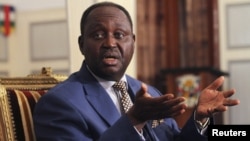BANGUI, CENTRAL AFRICAN REPUBLIC —
Central African Republic President Francois Bozize maintains that he will not be forced out of office by rebels who are threatening the capital and are demanding the president step down. He spoke to reporters in Bangui on the eve of peace talks with the rebels set to open in Gabon on Wednesday.
There looks to be little room for give and take between the Seleka rebel coalition and the government of the Central African Republic as they head into talks Wednesday in Libreville.
President Francois Bozize reaffirmed late Tuesday that he will not consider stepping down as rebels are demanding.
He says he was elected in 2005, and again in 2011. He says he has already made very large concessions ahead of talks - referring to his offer to negotiate a coalition government and his affirmation that he will not run for a third term in 2016. What more could they ask, he says. He says the constitution is "untouchable" for the true citizens of this country.
Change, he said, "comes through the ballot box not by violence or by guns."
Rebels in the north have repeatedly risen up against Mr. Bozize since that 2005 election, two years after he had seized power in a military coup d'etat. Some are disgruntled ex-supporters of Mr. Bozize; others backed the president he ousted, Ange Felix Patasse.
The rebel coalition, known as Seleka, has seized one-third of the country and is now within 85 kilometers of the capital, Bangui. Government troops have been sorely outmatched. A multinational African force now stands between the rebels and the capital.
Seleka draws fighters from three main rebel groups in the north who say the government failed to fully implement peace accords signed in 2007 and 2008.
Bozize said the government goes to Libreville to call on rebels to pull out of the captured territory, as ordered by regional heads of state.
He said the government is ready to listen to what these "outlaws" have to say so long as it deals with the best interests of the country.
Bozize continued to make reference to foreigners among the fighters, who he said are after the country's mineral and oil resources, referring to them as "mercenary-terrorists."
He says the information they have points to the presence of militiamen and fighters who do not speak the local Sango language, French or English. He says he is referring to people who come from beyond neighboring countries. He says the situation is much less clear than it seems to observers and to the political opposition, which he says is close to Seleka, something the opposition denies.
There has been no independent verification of the presence of foreigners in rebel-held areas. Access to the area is restricted and cell phone communications are down in much of the region.
A delegation from the political opposition will take part in the talks in Libreville alongside delegations from the rebels and the government. The talks will be mediated by the president of the Republic of Congo, Denis Sassou Nguesso.




